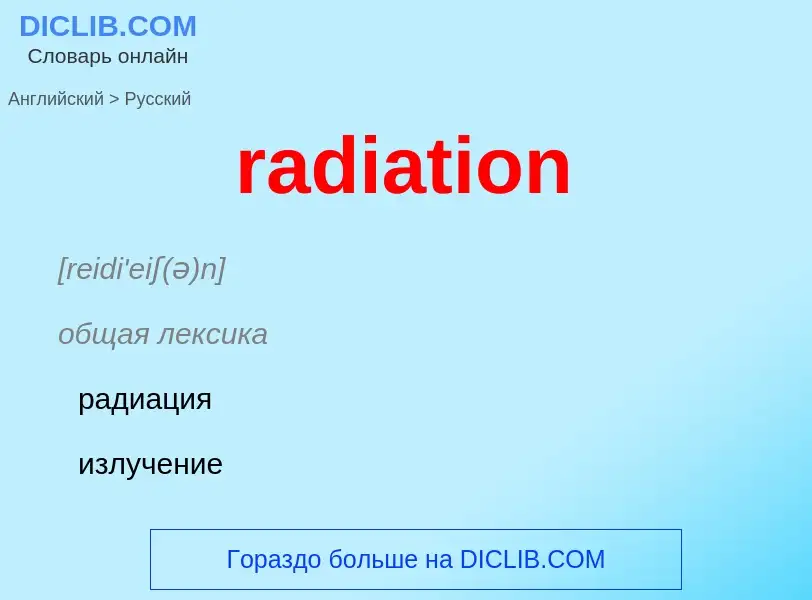Μετάφραση και ανάλυση λέξεων από την τεχνητή νοημοσύνη ChatGPT
Σε αυτήν τη σελίδα μπορείτε να λάβετε μια λεπτομερή ανάλυση μιας λέξης ή μιας φράσης, η οποία δημιουργήθηκε χρησιμοποιώντας το ChatGPT, την καλύτερη τεχνολογία τεχνητής νοημοσύνης μέχρι σήμερα:
- πώς χρησιμοποιείται η λέξη
- συχνότητα χρήσης
- χρησιμοποιείται πιο συχνά στον προφορικό ή γραπτό λόγο
- επιλογές μετάφρασης λέξεων
- παραδείγματα χρήσης (πολλές φράσεις με μετάφραση)
- ετυμολογία
radiation - translation to ρωσικά
[reidi'eiʃ(ə)n]
общая лексика
радиация
излучение
эволюционная радиация
в общем случае - излучение энергии в виде электромагнитных волн
радиоизлучение
лучеиспускание
лучистый
радиационный
радиометрический
медицина
лучевой (об излучении)
существительное
общая лексика
излучение, лучеиспускание, радиация
лучевой
физика
излучение
радиация
лучеиспускание
облучение
радиоактивное излучение
сияние
радиальное расположение
расхождение из одного центра в виде лучей
Ορισμός
Βικιπαίδεια
In physics, radiation is the emission or transmission of energy in the form of waves or particles through space or through a material medium. This includes:
- electromagnetic radiation, such as radio waves, microwaves, infrared, visible light, ultraviolet, x-rays, and gamma radiation (γ)
- particle radiation, such as alpha radiation (α), beta radiation (β), proton radiation and neutron radiation (particles of non-zero rest energy)
- acoustic radiation, such as ultrasound, sound, and seismic waves (dependent on a physical transmission medium)
- gravitational radiation, that takes the form of gravitational waves, or ripples in the curvature of spacetime
Radiation is often categorized as either ionizing or non-ionizing depending on the energy of the radiated particles. Ionizing radiation carries more than 10 eV, which is enough to ionize atoms and molecules and break chemical bonds. This is an important distinction due to the large difference in harmfulness to living organisms. A common source of ionizing radiation is radioactive materials that emit α, β, or γ radiation, consisting of helium nuclei, electrons or positrons, and photons, respectively. Other sources include X-rays from medical radiography examinations and muons, mesons, positrons, neutrons and other particles that constitute the secondary cosmic rays that are produced after primary cosmic rays interact with Earth's atmosphere.
Gamma rays, X-rays and the higher energy range of ultraviolet light constitute the ionizing part of the electromagnetic spectrum. The word "ionize" refers to the breaking of one or more electrons away from an atom, an action that requires the relatively high energies that these electromagnetic waves supply. Further down the spectrum, the non-ionizing lower energies of the lower ultraviolet spectrum cannot ionize atoms, but can disrupt the inter-atomic bonds which form molecules, thereby breaking down molecules rather than atoms; a good example of this is sunburn caused by long-wavelength solar ultraviolet. The waves of longer wavelength than UV in visible light, infrared and microwave frequencies cannot break bonds but can cause vibrations in the bonds which are sensed as heat. Radio wavelengths and below generally are not regarded as harmful to biological systems. These are not sharp delineations of the energies; there is some overlap in the effects of specific frequencies.
The word "radiation" arises from the phenomenon of waves radiating (i.e., traveling outward in all directions) from a source. This aspect leads to a system of measurements and physical units that are applicable to all types of radiation. Because such radiation expands as it passes through space, and as its energy is conserved (in vacuum), the intensity of all types of radiation from a point source follows an inverse-square law in relation to the distance from its source. Like any ideal law, the inverse-square law approximates a measured radiation intensity to the extent that the source approximates a geometric point.

![[[Alpha particle]] detected in an [[isopropanol]] [[cloud chamber]] [[Alpha particle]] detected in an [[isopropanol]] [[cloud chamber]]](https://commons.wikimedia.org/wiki/Special:FilePath/Alpha particle detected in an isopropanol cloud chamber.jpg?width=200)
![The [[electromagnetic spectrum]] The [[electromagnetic spectrum]]](https://commons.wikimedia.org/wiki/Special:FilePath/Electromagnetic-Spectrum.png?width=200)
![[[Electrons]] (beta radiation) detected in an [[isopropanol]] [[cloud chamber]] [[Electrons]] (beta radiation) detected in an [[isopropanol]] [[cloud chamber]]](https://commons.wikimedia.org/wiki/Special:FilePath/Electron detected in an isopropanol cloud chamber.jpg?width=200)
![Gamma radiation detected in an [[isopropanol]] [[cloud chamber]]. Gamma radiation detected in an [[isopropanol]] [[cloud chamber]].](https://commons.wikimedia.org/wiki/Special:FilePath/Gamma radiation detected in an isopropanol cloud chamber.jpg?width=200)

![Some kinds of [[ionizing]] radiation can be detected in a [[cloud chamber]]. Some kinds of [[ionizing]] radiation can be detected in a [[cloud chamber]].](https://commons.wikimedia.org/wiki/Special:FilePath/Radon decay in a cloud chamber.jpg?width=200)
